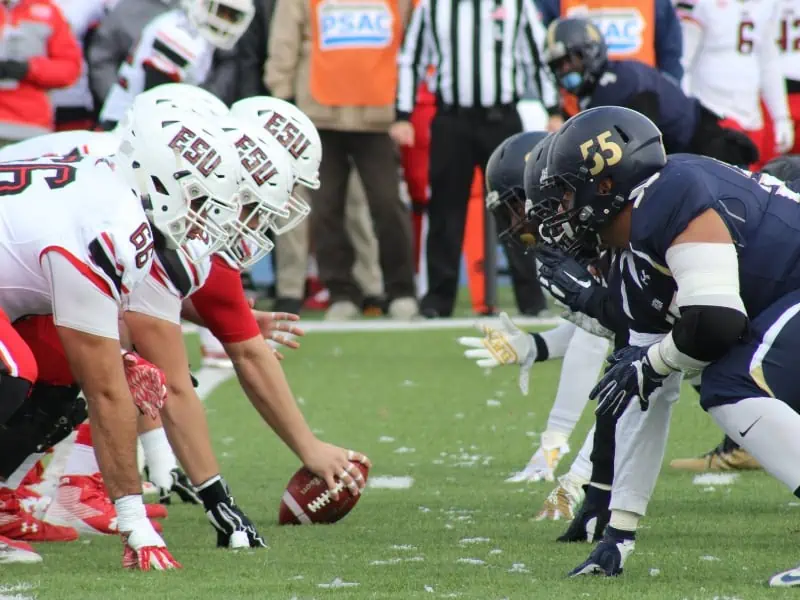I Swore I Would Never Let My Child Play Football… Until I Did

This post may contain affiliate links. If you buy through the link, I may earn a commission. Learn More.
The number one lesson I have learned as a parent is to never say never.
The moment I say, “I will never let my child…” it’s almost a guarantee that you will definitely be letting your child do that thing.
Football held the top spot on my list of nevers.
Should You Let Your Child Play Football?
It’s a personal choice. Parents who cite issues with head trauma as reasons to not allow their children to play football are not wrong to do so. However, letting your child play football helps to teach them about teamwork, responsibility and the importance of hard work and exercise.
The Argument Against Kids Playing Football “The Cons”

If you are reading this right now, I don’t have to tell you that football is a dangerous sport. All football players have a risk of developing Chronic Traumatic Encephalopathy, or CTE.
This brain injury occurs from the impact of athletes tackling each other at high speeds during games and at practice.
Studies have shown that nearly 100 percent of professional football players suffer from some type of brain injury.
Studies also show that concussions are the most common type of injury in high school sports and they are most likely to occur among football and soccer players.
It’s not just head trauma that leads to injury.
My own son has had two serious injuries and two major surgeries over the course of his high school football career. In one instance, a tackle gone awry caused a portion of his elbow to break free.
He was out for the rest of the season, had his bone screwed back in place and underwent physical therapy to re-strengthen and stretch the muscle that was attached to the breakaway bone.
His second injury involved a strain to his ACL, which has led to a lifelong commitment to a knee brace any time he is playing sports.
Injury is the major reason parents speak out against football. For some, there is another issue in place: the environment. Some moms despise the football culture.
They dislike having their children in an environment that promotes sports-related violence when other sports, like tennis or cross country, have little to no contact.
These alternatives provide other outlets for physical exertion and competition that parents sometimes feel are mentally and emotionally healthier than football.
Why My Child Plays Football?
Before my husband and I ever had children we agreed that sports are important. We love that sports provide physical activity within a social environment.
Both of us were athletes in high school. I was a basketball cheerleader and I played tennis. My husband played football, basketball and ran track.
We both said that we didn’t care what sports our children played as long as they were active and happy. My one rule was no football.
We gave our children the chance to play whatever sport they desired. By the time he was 10, my son had joined baseball, soccer, basketball, cross country and track teams.
He had also tried his hand at gymnastics and swimming. He tolerated cross country and basketball, but he hated the rest. At 10 years old, he asked if he could try football.
I looked into the football leagues in my town. There was a full-tackle option and a flag football league.
The risk of injury in flag football is far less than in tackle, so my husband and I agreed to let him try.
The one caveat was that he would only play flag football. The league was open to players through age 12. At that point, football would be over.
SPOILER ALERT!
It wasn’t over. My son fell in love with football. He loved the strategy involved with the plays.
He ate it up like it was made just for him. He practiced daily with no complaints.
Football had become his passion. For my child, this was a big deal. He is a very intelligent kid who is talented in many areas.
Things just come easily to him, except for sports. With every other sport he tried, it was just too hard and not worth the effort to him. When I saw how he really tried with football, I found that exciting.
For the first time, he found it worthwhile to put forth real effort. Neither my husband nor I felt like we could take that away from him.
This doesn’t mean football is without its worries. We have seen a child sustain a spinal injury on the field. We’ve seen multiple concussions.
One of my son’s teammates had a compound fracture during a game, which is something no one wants to see. The idea that he could have a serious injury is frightening.
However, I keep things in perspective.
This morning, while I am writing this, my son is at off-season football practice. He may be injured while he is there.
At the same time, he drove himself to football practice. He is far more likely to suffer from a car accident than a football injury.
It would be unthinkable to expect him to never drive or ride in a car. Why would football, which is far less risky, face more scrutiny than driving?
Raising Children to Make Their Own Choices
There are different parenting styles. Many of them are equally successful. My approach is to let my children make most of their own decisions.
I give them what they need in life. I do my best to help them make the right choices and to give them guidance.
Though it’s not always feasible, I do my best to honor the decisions they make. This is particularly true when it comes to extracurricular activities.
I would have never chosen football for my son, but I respect that he loves it enough to continue striving even after injuries.
I am also happy that he is learning that he has a voice in his own life. He feels a sense of empowerment and he doesn’t feel as though his life is dictated to him by his parents.
Letting a child make their own decisions in areas that can be unhealthy or dangerous is difficult for a parent. We want to protect our children as much as and for as long as we can. There is nothing wrong with that.
I do put limits on the decisions my son can make. For instance, he has to do his homework before he can take part in any extracurricular activities.
Studies always come first. However, the classes he takes are mostly for him to decide. I know parents who plan their children’s courses for them and I know parents who are completely hands off.
My rules are that creative classes should be limited to one per semester and a foreign language is a must. Beyond that, it’s up to him to decide.
The Pros of Kids Playing Football

Football isn’t all grunting and tackling. Football teaches a great many life skills that will benefit players for the rest of their lives.
While they are unlikely to still be playing into middle age, and most players are unlikely to go pro, there are still wonderful things about football.
1. Players Learn About Teamwork
Team sports of any kind teach children the importance of working together. This is especially true of a sport like football.
No one player can win or lose a game. All positions have to rely upon each other. The kids learn what it means to trust and be trusted.
This is also true off the field. Players must have passing grades in order to stay on the team, which means they sometimes need to work together to study.
2. Hard Work and Exercise Pays Off
Players cannot succeed if they don’t work out. My son’s team practices three days per week during the off-season.
They lift weights, run drills and even do yoga. During the season, they do two-a-days. They have practices in the morning and again at night.
There is a direct correlation between the amount of practice and the success of the team.
3. They Become Part of Something Bigger Than Themselves
I grew up in a Friday Night Lights town. Everyone in my town turned out for the football game, whether it was at our high school or far away.
Everybody involved with the football team, from players to managers to spectators, were part of the atmosphere.
Your child might go to a larger school in a bigger city where football isn’t as ingrained in the culture, but it is still an important part of the high school experience.
Even younger children who attend youth football leagues will see the spectators and know that they are part of something special.
4. Odds of Going to College Increase
Not everyone who plays high school football will be granted a football scholarship. About 10 percent will go on to play football in college.
That said, many of those players might not have had the opportunity to go to college at all without the discounting made available through scholarships. The average cost of tuition is, at best, about $10,000 per year.
That doesn’t include room, board and other fees. For many families, the sticker price of college is enough to remove it as an option. Football can help at least some players further their education.
5. It Looks Good on College Applications
Some students will go to college regardless of their participation in football. However, adding a sport to a college application shows well-roundedness.
It can help students get into their dream schools or receive certain scholarships that aren’t even affiliated with sports.
For instance, one of the Harvard admission ratings focuses on sports. Those involved in sports receive a higher rating than those who are not.
A sport like football can stand out at an elite university where country club sports like rowing, fencing, golf and squash dominate the applicant pool.
How to Prevent Injury

The most prevalent reason parents don’t want their kids playing football is injury. Luckily, there are ways to prevent some of these injuries. These prevention techniques are improving all the time.
1. Training
Training is the best way to avoid injury. Football players who are strong, sturdy and quick to react can lower their risk of suffering from a tackle or a fall.
My son’s elbow injury could have been avoided if he had not caught himself with his hand, which caused the arm to buckle and the bone to snap.
Training on how to fall might have avoided the pain of recovery and multiple surgeries.
2. Protection
Once upon a time, football players wore leather helmets. After countless injuries, a harder helmet was enacted.
Today, there are helmets that are concussion proof. These helmets are not yet the norm because they are incredibly expensive.
The players on my son’s team will need to pay $650 for the helmet alone, which is next-to impossible for schools with tight budgets and many families.
Along with these helmets, players have padding that, if worn properly, can often prevent other types of injuries.
3. Position
Your child does have a say in what position they play. If your child is on the small side, there are places they don’t belong.
A child that is thinner or shorter could be a good running back, safety, kicker or might excel on special teams.
Even if they have a lot of skill, a 300-pound offensive tackle can cause significant damage to a 120-pound defensive lineman. Just ask my son’s elbow.
Key Takeaways
Whether you let your child play football is up to you. I suggest letting them try if it’s what they want to do.
In most cases, the reward far outweighs the risk. What are your thoughts? Tell us in the comments!
Have You Read These Yet?
Here are some articles related to “should you let your child play football?”
